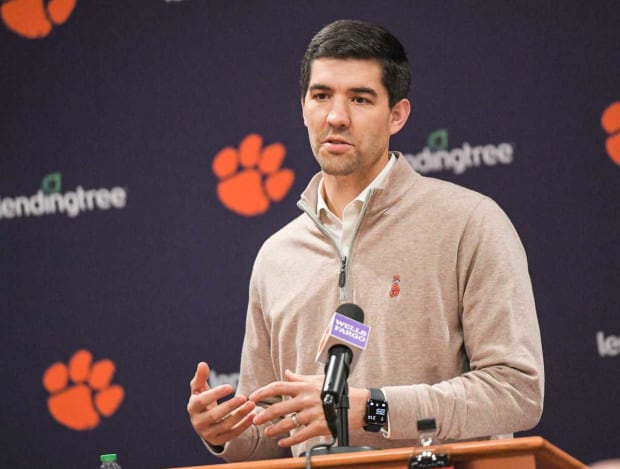ACC commissioner Jim Phillips says he’s not surprised seven of the schools in his league may just be looking for greener pastures. He said bluntly in his opening statement after conference meetings concluded: “That just isn’t news to me per se.” But it certainly was news to at least a few of the athletic directors in the room, who had a spirited discussion amongst each other before Phillips even walked in. The reveal of exactly who those schools were as meetings began came when the Action Network’s Brett McMurphy tweeted this:
Clemson, FSU, Miami, UNC, NC State, Virginia & Virginia Tech are “The Magnificent 7” ACC schools, sources told @ActionNetworkHQ. These schools, @RossDellenger reported, have met in past several months, w/lawyers examining grant-of-rights to determine just how unbreakable it is.…
— Brett McMurphy (@Brett_McMurphy) May 15, 2023
At least two ADs remarked that the full reveal made things contentious in the room. One of them playfully said so to McMurphy’s face on their way out of the meetings Wednesday. The reveal actually helped plow the road for productive discussions about new revenue models, because cards were on the table whether those seven schools wanted them to be or not. Conversations about a new revenue model have been held among some ADs for more than a year, and the seven schools in question met periodically over multiple months.
From here, nothing has been formally decided upon as far as a new revenue model. The final decision will rest with the 15 school presidents and chancellors. Leading the way in that room is a subcommittee of six presidents from Virginia, Virginia Tech, Wake Forest, Syracuse, Florida State and Clemson.
There are the politics of the room in Amelia Island, Fla., and the politics of individual campuses as well. In this situation, an AD like Clemson’s Graham Neff has to balance what he says to campus leaders (including his own boss, president Jim Clements) and how he interacts with other ADs in the league. Neff is returning to campus for a Thursday board meeting with the IPTAY booster club. There are the normal agenda items like facilities, but you can certainly guess what will take up the bulk of the meeting time. As far as Clemson is concerned, having a president on the subcommittee deciding the new revenue model boosts alignment. Neff and his boss know exactly what’s happening and can work more collaboratively—not every school president is all that interested in athletics or being involved, even in key decisions.
“For us to continue to do what’s best for Clemson, it’s born out of that alignment and that importance for Clemson and Clemson athletics,” Neff says. “And because of that, spending time down here with our conference and colleagues and being direct and forward about that, that has been and will continue to be my tact on it.”

Ken Ruinard/USA TODAY NETWORK
As far as the revenue model they end up with, it certainly will not be the end of the discussion about how to further monetize to continue to make up for the gap.
“There’s growing the pie—so we talk about different revenue growth and sponsorships and branding, and competitive success. That means scheduling, that means championship games, that means how are we incentivizing all our sports,” Neff says. “Obviously football carries the most value there. That’s the job of the ADs, is to think collectively about how to continue to drive that. Clemson has been and will be a great and proud member of a conference to do that. We’re gonna continue to push and lead the right way to help raise the profile for the rest of the members.”
The ACC was never going to collapse in that room this week. Realignment action doesn’t happen that quickly, even though it may appear that way given the time span between USC and UCLA rumors bubbling and the announcement of their move to the Big Ten, similar to Texas and Oklahoma to the SEC.
There are two prongs to the realignment puzzle: Can you leave both legally and from a business perspective? You have to have an affirmative answer to both questions. Most people focus solely on the broadcast rights component of the Grant-of-Rights agreement, where each school surrenders control over its media rights for the life of the deal to the league, and if they leave, would be on the hook for the cost. But what is even thornier from a legal perspective is the second clause in the ACC’s agreement, where schools surrender their copyrights to the conference as well. If Clemson were to leave tomorrow, and play in a (hypothetical) SEC game tomorrow, then there’s an argument that it would be committing copyright infringement. Copyright law is complex, but it also has deep precedent, which means finding a loophole there may be yet another thing that is legally tricky. And even if all of that is squared away, there’s the matter of whether the league Clemson would wish to go to is actually ready and willing to add.
We think of conferences as ancient blood oaths with deep ties that bind because of the classic games and memorable moments. The ACC’s basketball tournament, for instance, is about as beloved as anything in the sport besides the NCAA’s actual tournament. But a conference’s purpose in the here and now, especially at the Power 5 level, is to administer championships and bundle television rights to sell to distribute revenue to each member school. The latter is a colder business calculation of its role in college sports, and it’s why it shouldn’t surprise you when seven schools consider a cold business decision of their own.







